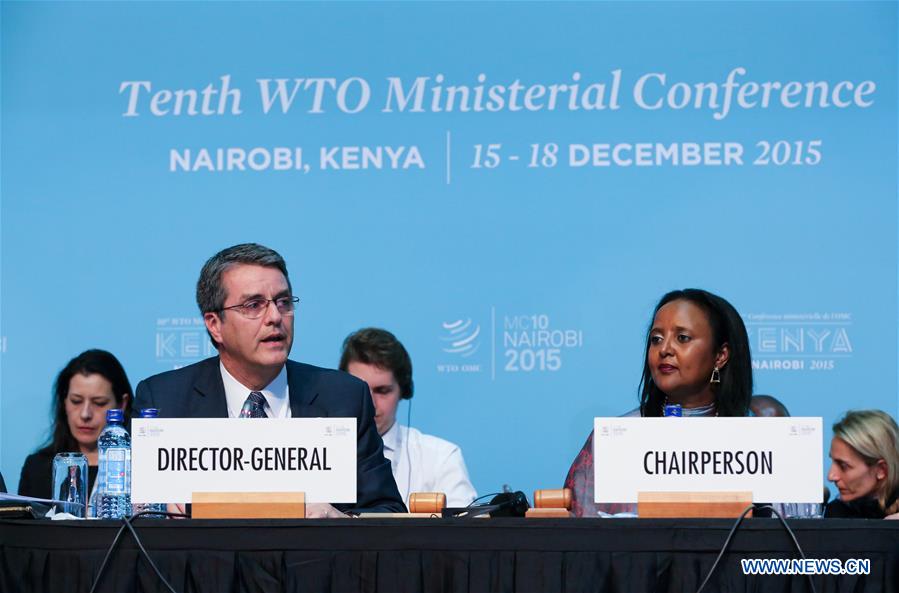Recap of the 10th WTO Ministerial Conference in Nairobi: 15th to 18th December 2015
- Jacquelene Mwangi |
- December 19, 2015 |
- CIPIT Insights

‘The existential rationale of the WTO is irrefutable. Its centrality in international trade relations cannot be substituted. If the rules‐based multilateral trading system did not exist, we would have to create it. If it fails because of leadership deficits and inability to make rational choices, we would have to re‐create it. We are dealing with the logic of history. The failed League of Nations was substituted by the United Nations. If we are awkward and impractical and do not make the hard choices to renew the WTO and if we lose it, we would have to re‐create it and it would be infinitely harder to do so’- Ambassador Amina Mohammed.
Such were the words stated by the chair of the Tenth Ministerial Conference of the WTO on Tuesday, 15th December at the opening ceremony. Words that reveal that perhaps the WTO has not been the umbrella of hope for multilateral trade as envisioned 20 years ago; that perhaps it has not fully achieved its objectives and that despite all this, it must exist whether we want it to or not!
For the first time, the conference was hosted by an African country, a factor which many saw as a breakthrough for developing countries in terms of reaping gains and achieving a platform of fair trade within WTO’s multilateral system. However, at first the trade talks seemingly were a tug of war- to reaffirm the Doha Development Agenda or not!
Delegation after delegation stood up at the plenary session declaring their expectations of the Nairobi Ministerial. For most delegations the message was that ‘bringing new issues without resolving the Doha Development Agenda risks diverting attention away from development and the unresolved inequalities in the global trading system.’
A number of factors were noted as being challenges to WTO’s system including trade protectionism, a practice in which states put up barriers to trade through import tariffs and other restrictive regulations; and the proliferation of regional trade agreements in which developed countries continue to trample on developing countries.
The message was therefore straight and clear- this momentous conference had to deliver a package that favors least developed countries and provide a fair trading ground for developing and developed countries.
‘For the Africa group, Nairobi cannot and must not be a burial ground for the Doha work program. This conference must not go down into history as being one that served to dictate its outcomes based on domestic regimes of some members. The WTO cannot be a truly global organization if its main objective is to internationalize domestic laws of a few affluent members. It is the hope of the African group that in the few days we have in Nairobi real political calls will be made for the benefit of the poorest people in developing countries. In this regard, outcomes without tangible deliverables in the area of agriculture including cotton will be a betrayal of hopes and dreams of many farmers in Africa hoping for the WTO to address their needs..’ Mr. Joshua Setipa, Lesotho’s MInister for Trade and Industry.
Indeed, as the Minister of Commerce for China said, it is better to light a candle than to curse the darkness. In the end, the negotiations in Nairobi bore some fruit to the developing countries call for reaffirmation of the Doha Agenda- a compromise was reached after nights of negotiating. These have been referred to as ‘breakthroughs’ and they include:
- The elimination of export subsidies for farmers in developed countries which will now enable an even trading field for farmers across both developed and developing countries. This will ensure export competition- a gain for developing and least developed countries which heavily rely on agricultural produce as exports.
- The decision to eliminate tariffs on 201 Information Technology products whose annual trade is valued at over 1.3 trillion dollars and accounts for 10% of global trade, set to benefit all members of the WTO. Products envisioned under the IT Agreement include: new generation semi-conductors, GPS navigation systems, medical products including magnetic resonance imaging machines, machine tools for manufacturing printed circuits, telecommunication satellites and touch screens. In effect, IT products will cheaper thus promoting technological innovation.
- The Accession of Liberia and Afghanistan increasing WTO membership to 164.
The much anticipated discussion on TRIPS and Public health was a no show- thwarting my expectations and those of other IP enthusiasts such as IP Checkin. Nevertheless the gains of the Nairobi package will hopefully be felt by people across the African region and other developing & least developed countries.
*Special Thanks to the Bloggers Association of Kenya for facilitating my attendance of the Conference.
